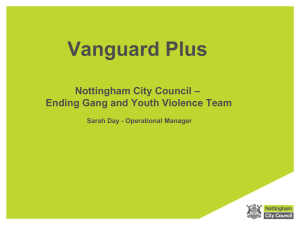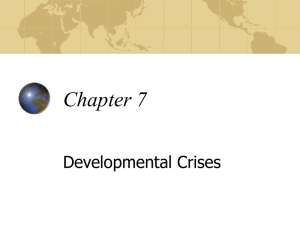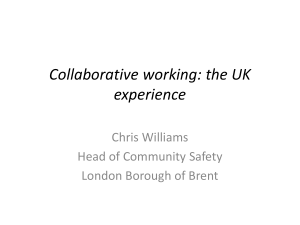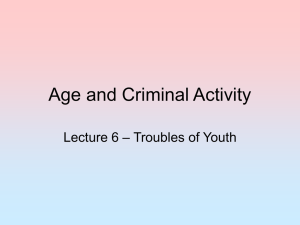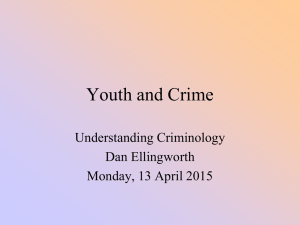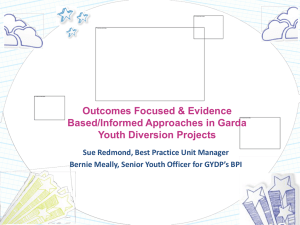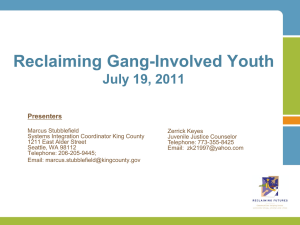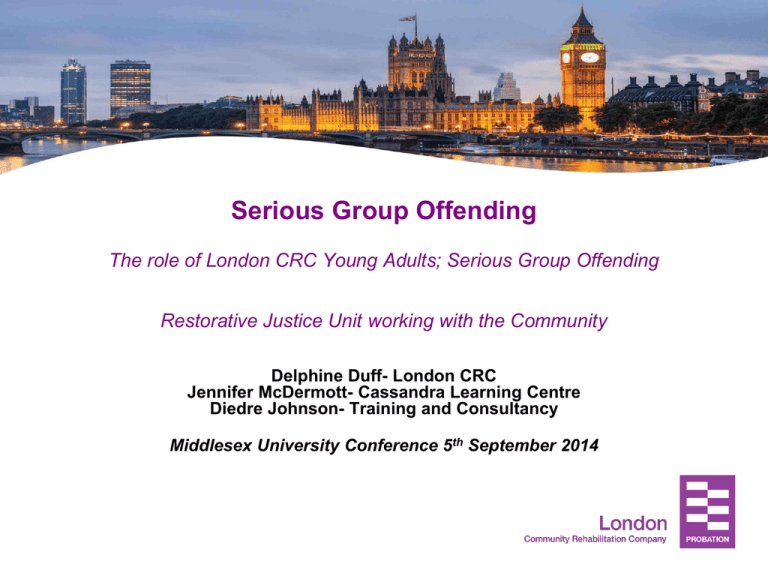
Serious Group Offending
The role of London CRC Young Adults; Serious Group Offending
Restorative Justice Unit working with the Community
Delphine Duff- London CRC
Jennifer McDermott- Cassandra Learning Centre
Diedre Johnson- Training and Consultancy
Middlesex University Conference 5th September 2014
Serious Group Offending
London Probation Trust coined the phrase
“ Serious Group Offending”- to encompass
all aspects of the offending and related
behaviours and harms associated with
gangs.
(accepted within CRC Serious Group Offending; young Adult and
Restorative Justice Unit 2014)
Serious Group Offending; Young
Person and Restorative Justice
Unit rationale
• Long term developing problem in London
• Concentration of offenders aged 18-24
• Need to identify and build on work already achieved
London Gang Profile
• 3,495 gang members – 224 gangs
• 2,480 (71%) live in community – 1000 in
custody, 300 subject to judicial orders
• 70% aged 17-23 yrs old
• 97% male
• 77% BME
( Trident
Gang Crime Command 2014)
Pan London
Serious Group Offending (SGO) Caseload
Profile
1,827 cases across both NPS and CRC organisations
Currently 616 cases (34%) CRC-managed
CRC service user overall age range: 17yrs – 47yrs
(Predominant age range is18-27yrs. This accounts for 531 service users)
610 Males (99%); Females 6 (1%)
Ethnicity breakdown – please see table in next slide
Pan London
Serious Group Offending (SGO) Caseload
Profile
The pre-dominant ethnicity
types Black African and Black Caribbean
account for over half
(55.5%)
of total ethnicities
represented
Risk Management
Considerations
•
•
•
•
•
•
•
•
Demographic profiling
Hotspot Areas
Cross Border Tensions
Housing
Local Rivalries
Offending Profile
Crimenogenic vs Protective factors
Information Sharing
Hierarchy of Needs
What will the unit be involved in?
•
•
•
•
•
•
Developing SGO SPOC roles and responsibilities
Develop and Review London Gang Profile
Co work SGO cases
Devise programmes and other initiatives
Co ordinate local responses to SGO issues
Develop “Best Practice” toolkit for staff
What we will be involved in cont...
SGO Unit Interventions:
•
CRC Intranet
•
Gang Screening Tool
•
Gang registration - DELIUS
•
SGO Guidance for staff
•
Pan London Mapping gang profile
•
•
1-2-1 programmes
Exit Programme – available in Greenwich; Lewisham; Croydon; Hackney;
•
Restorative Justice- being designed to address SGO related conflict
EXIT- The Intensive Alternative
to Custody Opportunity for
Young Men 18-25
Background
• London Probation Trust had a young adult
population of 6159 offenders which represented
15.1% of the caseload.
• Research shows that programmes that keep people
out of custody are both beneficial to the offender
and cost effective to the state. This is particularly the
case for young adults who have been shown to
respond best to intensive programme. Mentoring has
been shown to be effective in reducing crime.
• EXIT programme was coordinated centrally through
the LPT SGO unit- now transferred to CRC Unit
What is Exit?
• An intensive order which provides structure and enables a
young person to develop commitment and motivation a model
should be flexible, responsive, reflect local needs and therefore
tailored specifically for the individual person
• In addition, all service users will be provided with individual
mentoring and access to social pathways to promote and
develop life skills and support to achieve full re-integration into
the community.
• Currently being piloted in 4 Boroughs: Greenwich, Lewisham,
Hackney and Croydon extended from November to - Camden
and Islington; Hammersmith and Fulham; Kensington and
Chelsea
Who is it aimed at?
• The Exit programme targets male offenders
• Aged 18-25
• Must be facing immediate custody
• There is credible intelligence that they are either
gang affiliated or at significant risk of becoming
gang involved.
What does it involve....
• The Exit Programme has three elements and must include at least
one Punishment Requirement and the Supervision Rehabilitation
Requirement.
•
•
•
•
•
•
•
Punishment
Specialist Intensive Community Payback (min of 15 hours a week,
no more than 120 hours duration)
Attendance Centres
Control
Exclusion Zone
Curfew
Rehabilitation
Supervision
Programme
Specified Activity and/ or referral to community organisation
TO DATE
• 60 young men engaged in EXIT
• 5 young men known to have “exited” gang
lifestyle
• 3 young men now volunteering with Social
Pathways
• A number have greatly improved
employability status
• EXIT received Howard League Award
Contact Details
• Contact Persons: Strategic Managers : Andrew Hillas and
Patsy Wollaston Assistant Chief Officers
• Operations Manager : Delphine Duff Senior Probation Officer
• Email Address:delphine.duff@london.probation.gsi.gov.uk
• Location: Mitre House, Borough High Street
CASSANDRA LEARNING
CENTRE
Who is Cassandra Learning Centre
and what we do?
We are a charity that addresses domestic abuse
in adolescent and young adult relationships
(aged 13-25 yrs) through:
Raising awareness of domestic abuse amongst
young people;
Educating young people about healthy
relationships;
Raising awareness of domestic abuse amongst
services and professionals working with young
people.
What is Domestic Violence?
According to a government definition, domestic
violence is
• "Any incident of threatening behaviour, violence or
abuse (psychological, physical, sexual, financial or
emotional) between adults who are, or have been,
intimate partners or family members, regardless of
gender or sexuality.“
• But this doesn’t even account for teenage DV.
Other definitions, that do, include: sexual
exploitation and group affiliated behaviour
Grim facts…
• For every hour, as many as 115 children are abused
• 90% of children from violent homes witness their fathers beating
their mothers
• Children in homes where violence occurs are physically abused or
neglected at a rate 1500% higher than the national average
• Nationally 75% of battered women say their children are physically
or sexually abused
• More than half of the children abductions in this country occur within
the context of domestic violence
• More than two women a week are killed as a result of domestic
violence.
Sexual Exploitation
Sexual exploitation of children and young
people under 18 involves exploitative
situations, contexts and relationships where
young people (or a third person or persons)
receive ‘something’ (e.g. food,
accommodation, drugs, alcohol, cigarettes,
affection, gifts, money) as a result of them
performing, and/or another or others
performing on them, sexual activities.
Department for Education
Effects
………is a particularly disturbing form of
abuse with terrible consequences for victims.
The majority are forced into prostitution,
alcohol and or drug addiction; they often
become involved in street crime, lead lives as
domestic servants and suffer other forms of
exploitation
A cause for concern
• 2012 Barnardos services worked with 1,452
children and young people who had been
sexually exploited.
• sexual exploitation of girls in gangs is a very,
very, very serious problem. There is no
distinction between upbringing, age, ethnicity,
social class or ability.
• Sex is a weapon just like guns and knives, says
child safety expert (Professor Jenny Pearce)
Quotes …
•These girls don’t tell, they don’t complain, they don’t
report to the police. It’s just what happens.
•Once a girl has had sex with a gang member, forced or
otherwise, as far as the other boys are concerned, she
has no right to refuse sex under any circumstances ever
again.
•Girls are used, abused and discarded like a piece of
meat.”
•13-year-old boys raping 18-year-old girls. Any boy,
whatever age, even a 12-year-old, is above a girl in a
gang.
Case Study 1
• “It was only once we moved in together and I was
invested in the relationship that he began to
become violent. It took all the support of my friends,
family, the police and a woman’s refuge to get me
out,”
• She met her then boyfriend when she was just 18
years old. Often young people are unaware their
relationship is abusive and instead considers it a
sign of affection when their partner becomes
obsessive and controlling, leading to abuse in all its
form.
Case Study 1
• “It was only once we moved in together and I was
invested in the relationship that he began to
become violent. It took all the support of my friends,
family, the police and a woman’s refuge to get me
out,”
• She met her then boyfriend when she was just 18
years old. Often young people are unaware their
relationship is abusive and instead considers it a
sign of affection when their partner becomes
obsessive and controlling, leading to abuse in all its
form.
Case Study 3
• I was referred to Cassandra Learning Centre my College tutor. At the time she made
the referral I was contemplating suicide as an escape from the humiliation of my
family.
• The emotional abuse was constant and unbearable, they treated me like a leaper,
and I became distressed and isolated from my friends.
• My college work began to suffer as a result; I became homeless for a short period:
• I had Social workers but that wasn’t working either.
• I first met with someone from Cassandra Learning Centre who became my support
worker: She drew up an action plan with me: She re-assured me that she would do
everything she could for my voice to be heard.
• I was referred for one to one counselling, until I was in a much better place.
Cassandra Learning Centre advocates on my behalf every step of the way:
• They faced challenges from my family but they never left me. I have been in my flat
now, for two years: It has not easy, I am coping thanks the help and support of this
organisation.
• I am still in contact with the organisation. They still pick me up when I fall.
• They work with young men: I was 17 years and I was not doing well.
• Thank you Cassandra Learning Centre.
D Johnson Training &
Consultancy Ltd
Working in Partnership to deliver a
Black Self Development/Identity
Programme to serious group offenders
in HM Prisons
Rationale for BSD Programme
•
•
People from BME communities are over-represented at almost all stages of
the criminal justice process, disproportionately targeted by the police, more
likely to be imprisoned and more likely to be imprisoned for longer than white
British people. (IRR)
21,543 prisoners, was from a minority ethnic group.
Out of the British national prison population, 11% are black and 6% are
Asian.
Overall black prisoners account for the largest number of minority
ethnic prisoners (50%).
At the end of June 2012, 29% of minority ethnic prisoners were foreign
nationals.
•
According to the Equality and Human Rights Commission, there is now
greater disproportionality in the number of black people in prisons in
the UK than in the United States. (Prison Reform Trust).
The BSD Programme
• The Black Self Development Programme started
in 2001 as a result of a successful 2 year pilot
,delivered in partnership with London Probation
Service; buisness partners and NGOs, for
black offenders under supervision or on Licence.
• Subsequently the programme was delivered to
young people engaged with 11 youth offending
teams across central London.
Prisons delivered in
•
•
•
•
•
•
HMP Brixton.
HMP Bullingdon
HMP Huntercombe.
HMP Aylesbury
HMP Pentonville
HMP The Mount
Successfully achieving 75% in retention
and qualifications.
Theoretical Underpinning
• The BSD programme ‘s components are informed by humanistic,
control and experiential learning theories.
•
• The Project is unique in its approach – using an accredited cognitive
Social and Life Skills culturally based programme. It explores issues
of identity, aspirations, motivation, discrimination and black history.
•
• Written from a black perspective, the programme has the
advantages of re-educating, motivating and challenging black
offenders to redress their offending behaviour, explore their culture,
experiences, attitude and lifestyle in order for them to develop a
positive self image and move progressively towards disengaging
from criminal activities. The embedded Skills for Life component of
the programme is accredited by the London Open College Network.
•
Some of the contents covered
•
•
•
•
Knowing my roots
Taking charge of my past
Black people’s migration to Britain
Accepting responsibility for my
offending
• How to change my behaviour
• Understanding my family/community.
• Sexual health and drug/alcohol abuse
issues
Exercise Terry’s Story
• Case Study
So......the answers are in the questions we ask
ourselves and others...
• How do we define Community?
• What are our expectations?
• How do we engage “Communities in our work”?
• How can we all work together to effectively
address SGO- gang related activity
Thank You

